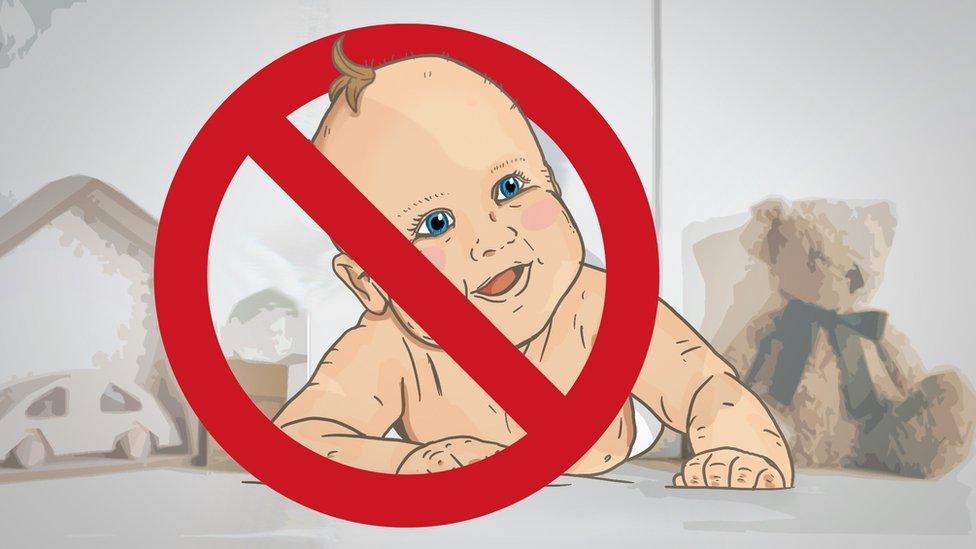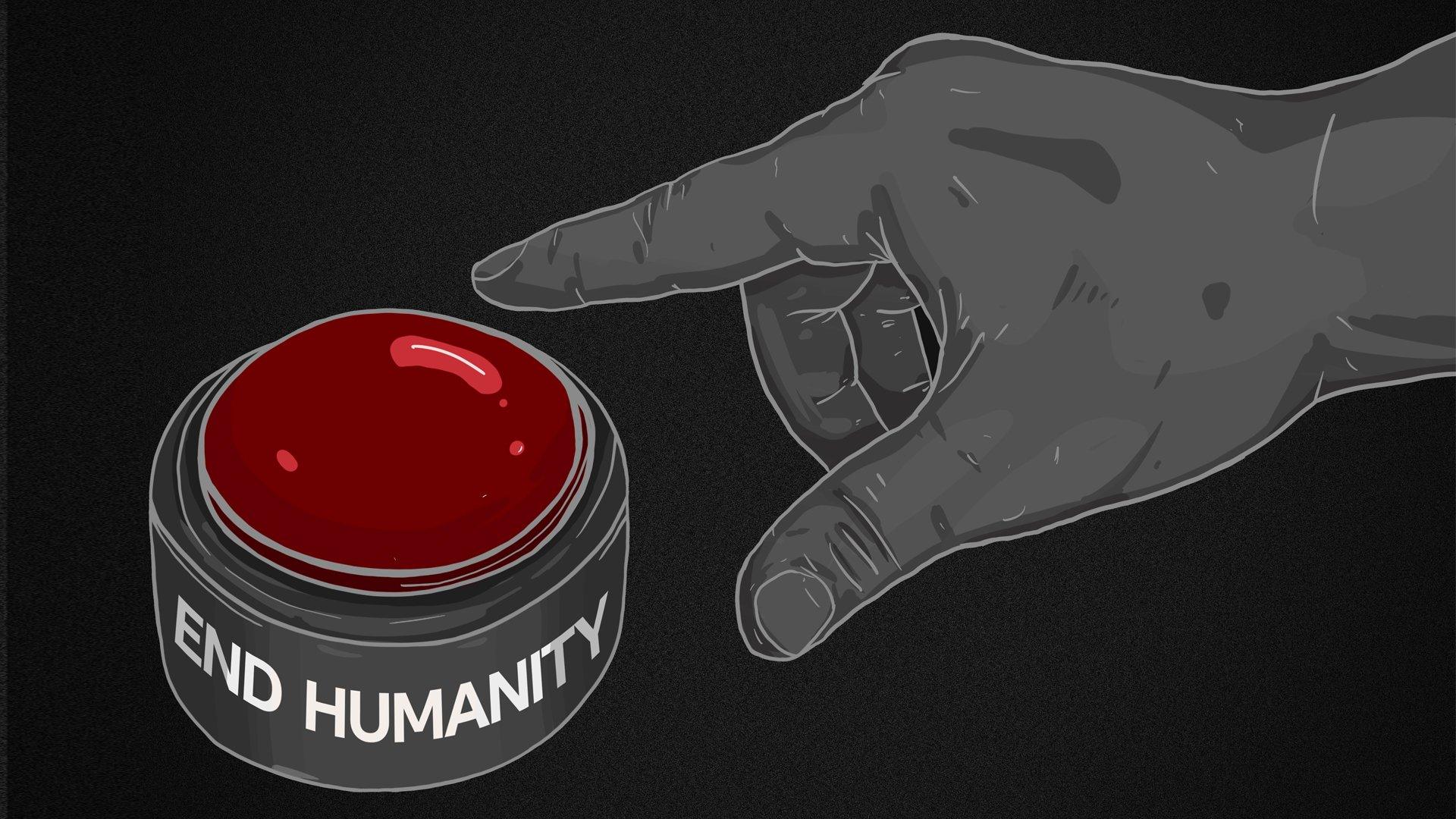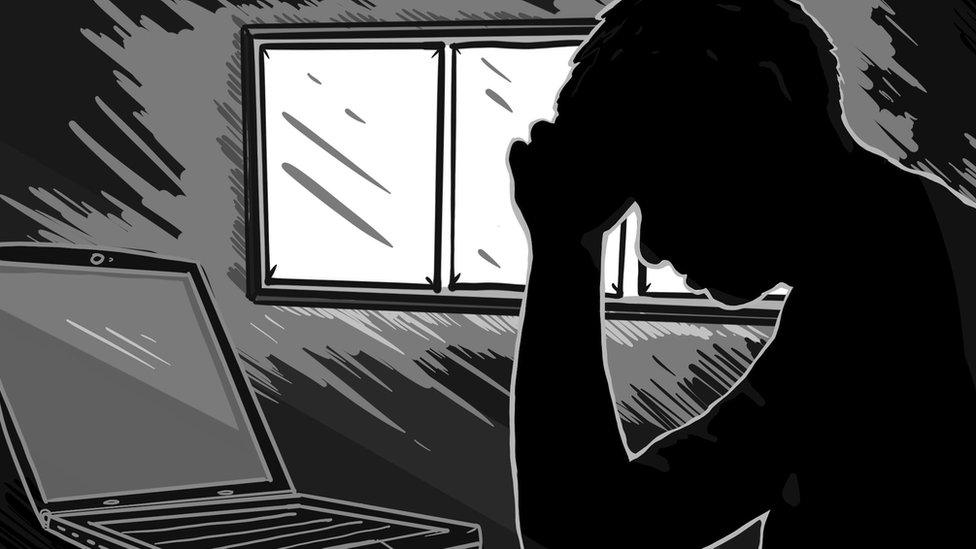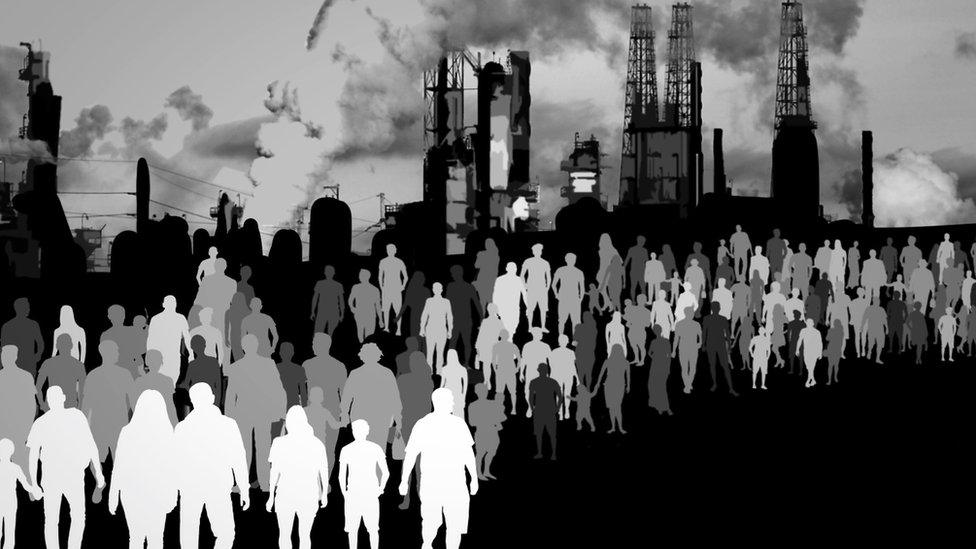Anti-natalists: The people who want you to stop having babies
- Published

They believe humans shouldn't have children. Who are the anti-natalists - and how far are they willing to push their ideas?
"Wouldn't it just be better to blow a hole in the side of the earth and just have done with everything?"
Thomas, 29, lives in the east of England, and although his idea of blowing up the world is something of a thought experiment, he is certain about one thing - humans should not have babies, and our species should gradually go extinct.
It's a philosophy called anti-natalism. While the idea dates back to ancient Greece, external, it has recently been given a huge boost by social media.
On Facebook and Reddit, there are dozens of anti-natalist groups, some with thousands of members. On Reddit, r/antinatalism, external has nearly 35,000 members, while just one, external of the dozens of Facebook groups with an anti-natalist theme has more than 6,000.
They are scattered around the world and have a variety of reasons for their beliefs. Among them are concerns about genetic inheritance, not wanting children to suffer, the concept of consent, and worries about overpopulation and the environment.
But they are united in their desire to stop human procreation. And although they are a fringe movement, some of their views, particularly on the state of the earth, are increasingly creeping into mainstream discussion.
While not an anti-natalist, the Duke of Sussex recently said he and his wife were planning to have a maximum of two children, external, because of environmental concerns.
Philosophical chat
Thomas hadn't heard of anti-natalism before someone used the term to describe his views in a YouTube comments thread a few years ago. Since then, he's become an active member of an anti-natalist Facebook group. It provides him with intellectual stimulation and a place to test his debating skills.
"I think it's awesome, you're discussing real life problems," he says. "You've got an idea - let's say humans do go extinct. What if humans then evolve again? Then you haven't really solved the problem.
"There's a lot of discussion, some of it gets quite touchy."
But his passion for anti-natalism isn't only theoretical. Thomas believes all human life is purposeless and has tried, although not succeeded, in getting a vasectomy on Britain's National Health Service (NHS). NHS doctors can refuse to perform sterilisation operations if they believe the procedure is not in the best interests of the patient, external.
Non-violence and consent
Despite some of the nihilist rhetoric in anti-natalist groups, there's no indication that they're a violent threat. When they do talk about extinction it often feels as though it's a debating exercise. No-one in their online communities is threatening murder or violence.
Thomas's idea of blowing a hole in the side of the earth - he imagines a big red button that would end human life and says he'd "press that in an instant" - is actually highly controversial because of a key anti-natalist principle: consent.
Put simply, it's the idea that creating or destroying life requires the consent of the person who will be born or die.
Hear more about anti-natalism on the Trending podcast from the BBC World Service: Download now
Kirk lives in San Antonio, Texas. He says he recalls a conversation with his mother when he was just four years old. She told him that having children was a choice.
"This doesn't make any sense to me, to voluntarily put someone who has no needs or wants prior to their conception into this world to suffer and die," he says.
Kirk says that even at that young age, he became an anti-natalist. He opposes the creation of human life because none of us were explicitly asked if we wanted to be here.
"If every person gave consent to play the game of life then I personally wouldn't have any objection to that," he concedes. "It hinges on the consent or lack thereof."
The concept also works in reverse. The problem with that big red humanity-eraser button is that plenty of people enjoy life - and not everyone would consent to it all coming to an end. Instead, Kirk and most anti-natalists want people to volunteer to stop giving birth.

Mental health issues
There's another distinct theme common in anti-natalist groups. Posters frequently share experiences of their own mental health, and occasionally condemn those with mental health problems for having children.
One post included a screenshot of a post from another user that read: "I have a borderline personality disorder, in addition to bipolar and generalized anxiety". The anti-natalist added their own comment: "This individual has two kids. I feel bad for the kiddos".
In another group, there was also a comment where someone was clearly contemplating suicide.
"I've had schizophrenia and depression," Thomas explains. "Depression does run in my family too. I think if I have kids there's a high likelihood that they're going to be depressed and they're not going to like their life."
But he also says the community is often wrongly labelled by outsiders.
"People start labelling us crazy psychos," he says. The truth, he says, is much more complex.

Saving the earth?
Fuelling anti-natalist arguments in recent years is an increasing focus on the environment and the potentially devastating effects of climate change.
Judging from posts in the anti-natalist groups, there's clearly a large overlap between their ideas and environmental activism.
"I feel that it is selfish to have children at this time," adds Nancy a vegan, plastic-free, animal rights enthusiast and yoga instructor from the Philippines."The reality is that the children being born into the world are creating more destruction for the environment."
In a Facebook group called "very angry anti-natalists" a petition is being shared which they hope to send to the United Nations. Its title is "Overpopulation root of the climate catastrophe - worldwide birth stop now." So far it has 27,000 signatures.
The idea of refraining from having children to benefit the environment isn't a new one. In Britain a charity called Population Matters, external has proposed this for years - although they are not anti-natalists. In fact, they argue in favour of the sustainability of the human race rather than its extinction.
"Our aim is to achieve harmony between the human race and the planet we're fortunate to inhabit," says Robin Maynard, the group's director. "If we have fewer children across the globe and smaller families we can achieve a much more sustainable population."
But will an increasing population necessarily lead directly to environmental disaster? According to the BBC's Global Population Correspondent Stephanie Hegarty, it's hard to say, because the future is so difficult to predict.
"According to scientific projections, due to economic development and dropping fertility rates, the population of the world is likely to plateau at about 11 billion in 80 years," she says. "Whether the planet can sustain that or not - we do not know.
"It's also very difficult to predict how many people the planet can sustain because it's all about consumption. And that means everything from air, water, food, fossil fuels, wood, plastic - the list goes on and on," she says. "Clearly some of us are consuming a lot more than others. A family of 12 in a country like Burundi will consume less, on average, than a family of three in Texas.
"There are so many factors that are going to be changing over the next decade and the next century that we can't predict right now."

Insults and criticism
Among the intense philosophical and ethical debates going on anti-natalist groups, there's a darker and less edifying undercurrent. Some routinely insult parents - calling them "breeders". Other slurs are directed at children.
"Whenever I see a pregnant woman, disgust is the first feeling." wrote one user next to a picture that said: "I hate baby bump".
But that doesn't mean that all anti-natalists hate children, according to those who spoke to the BBC.
"I would say I personally like children and it is because I like them that I don't want them to suffer," Nancy says. "Maybe bringing them into the world would give me some pleasure but the possible threat is so huge I'm just not sure it's worth it."
Going childless for the environment
But that's not the only criticism. In some anti-natalist groups, users allude to the notion that babies shouldn't be born in war zones, if there is a high chance of disability, or even to low-income parents. At times the rhetoric sounds like selective breeding - or eugenics.
The anti-natalists we spoke to had mixed feelings about those ideas.
"What are their motives behind having a kid?" says Thomas when asked if he's concerned about children being born in war-torn areas. "In such a country there's less hope that things are going to turn around."
He's more relaxed about children being born into low-income households.
"Obviously I'm against having kids... but I think you can be happy and in a low-income area."
"My anti-natalism is across the board," states Nancy. She opposes eugenics. "Why are we picking and choosing some groups because they are in a position of disadvantage?"
So is there a general anti-natalist life philosophy?
"Do the best you can," says Kirk. "Be kind - and don't procreate."
Blog by Jonathan Griffin, external
Illustrations by Gerard Groves
What did you think of this story? Email BBC Trending, external
Follow BBC Trending on Twitter @BBCtrending, external, and find us on Facebook, external. All our stories are at bbc.com/trending.